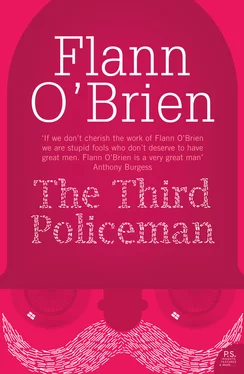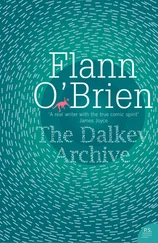On our way I said to Divney:
‘Where were you that time?’
‘Attending to important business,’ he answered. I thought he was referring to a certain thing and said:
‘Surely you could have kept it till after.’
‘It is not what you are thinking of,’ he answered.
‘Have you got the box?’
He turned his face to me this time, screwed it up and put a finger on his lip.
‘Not so loud,’ he whispered. ‘It is in a safe place.’
‘But where?’
The only reply he gave me was to put the finger on his lip more firmly and make a long hissing noise. He gave me to understand that mentioning the box, even in a whisper, was the most foolish and reckless thing it was possible for me to do.
When we reached home he went away and washed himself and put on one of the several blue Sunday suits he had. When he came back to where I was sitting, a miserable figure at the kitchen fire, he came across to me with a very serious face, pointed to the window and cried:
‘Would that be your parcel on the road?’
Then he let out a bellow of laughter which seemed to loosen up his whole body, turn his eyes to water in his head and shake the whole house. When he had finished he wiped the tears from his face, walked into the shop and made a noise which can only be made by taking the cork quickly out of a whiskey bottle.
In the weeks which followed I asked him where the box was a hundred times in a thousand different ways. He never answered in the same way but the answer was always the same. It was in a very safe place. The least said about it the better until things quietened down. Mum was the word. It would be found all in good time. For the purpose of safekeeping the place it was in was superior to the Bank of England. There was a good time coming. It would be a pity to spoil everything by hastiness or impatience.
And that is why John Divney and I became inseparable friends and why I never allowed him to leave my sight for three years. Having robbed me in my own public house (having even robbed my customers) and having ruined my farm, I knew that he was sufficiently dishonest to steal my share of Mathers’ money and make off with the box if given the opportunity. I knew that there was no possible necessity for waiting until ‘things quietened down’ because very little notice was taken of the old man’s disappearance. People said he was a queer mean man and that going away without telling anybody or leaving his address was the sort of thing he would do.
I think I have said before that the peculiar terms of physical intimacy upon which myself and Divney found ourselves had become more and more intolerable. In latter months I had hoped to force him to capitulate by making my company unbearably close and unrelenting but at the same time I took to carrying a small pistol in case of accidents. One Sunday night when both of us were sitting in the kitchen – both, incidentally, on the same side of the fire – he took his pipe from his mouth and turned to me:
‘Do you know,’ he said, ‘I think things have quietened down.’
I only gave a grunt.
‘Do you get my meaning?’ he asked.
‘Things were never any other way,’ I answered shortly. He looked at me in a superior way.
‘I know a lot about these things,’ he said, ‘and you would be surprised at the pitfalls a man will make if he is in too big a hurry. You cannot be too careful but all the same I think things have quietened down enough to make it safe.’
‘I am glad you think so.’
There are good times coming. I will get the box tomorrow and then we will divide the money, right here on this table.’
‘We will get the box,’ I answered, saying the first word with great care. He gave me a long hurt look and asked me sadly did I not trust him. I replied that both of us should finish what both had started.
‘All right,’ he said in a very vexed way. ‘I am sorry you don’t trust me after all the work I have done to try to put this place right but to show you the sort I am I will let you get the box yourself, I will tell you where it is tomorrow.’
I took care to sleep with him as usual that night. The next morning he was in a better temper and told me with great simplicity that the box was hidden in Mathers’ own empty house, under the floorboards of the first room on the right from the hall.
‘Are you sure?’ I asked.
‘I swear it,’ he said solemnly, raising his hand to heaven.
I thought the position over for a moment, examining the possibility that it was a ruse to part company with me at last and then make off himself to the real hiding-place. But his face for the first time seemed to wear a look of honesty.
‘I am sorry if I injured your feelings last night,’ I said, ‘but to show that there is no ill-feeling I would be glad if you would come with me at least part of the way. I honestly think that both of us should finish what the two of us started.’
‘All right,’ he said. ‘It is all the same but I would like you to get the box with your own hands because it is only simple justice after not telling you where it was.’
As my own bicycle was punctured we walked the distance. When we were about a hundred yards from Mathers’ house, Divney stopped by a low wall and said that he was going to sit on it and smoke his pipe and wait for me.
‘Let you go alone and get the box and bring it back here. There are good times coming and we will be rich men tonight. It is sitting under a loose board in the floor of the first room on the right, in the corner forenenst the door.’
Perched as he was on the wall I knew that he need never leave my sight. In the brief time I would be away I could see him any time I turned my head.
‘I will be back in ten minutes,’ I said.
‘Good man,’ he answered. ‘But remember this. If you meet anybody, you don’t know what you’re looking for, you don’t know in whose house you are, you don’t know anything.’
‘I don’t even know my own name,’ I answered.
This was a very remarkable thing for me to say because the next time I was asked my name I could not answer. I did not know.
De Selby has some interesting things to say on the subject of houses. 1 A row of houses he regards as a row of necessary evils. The softening and degeneration of the human race he attributes to its progressive predilection for interiors and waning interest in the art of going out and staying there. This in turn he sees as the result of the rise of such pursuits as reading, chess-playing, drinking, marriage and the like, few of which can be satisfactorily conducted in the open. Elsewhere 2 he defines a house as ‘a large coffin’, ‘a warren’, and ‘a box’. Evidently his main objection was to the confinement of a roof and four walls. He ascribed somewhat farfetched therapeutic values – chiefly pulmonary – to certain structures of his own design which he called ‘habitats’, crude drawings of which may still be seen in the pages of the Country Album. These structures were of two kinds, roofless ‘houses’ and ‘houses’ without walls. The former had wide open doors and windows with an extremely ungainly superstructure of tarpaulins loosely rolled on spars against bad weather – the whole looking like a foundered sailing-ship erected on a platform of masonry and the last place where one would think of keeping even cattle. The other type of ‘habitat’ had the conventional slated roof but no walls save one, which was to be erected in the quarter of the prevailing wind; around the other sides were the inevitable tarpaulins loosely wound on rollers suspended from the gutters of the roof, the whole structure being surrounded by a diminutive moat or pit bearing some resemblance to military latrines. In the light of present-day theories of housing and hygiene, there can be no doubt that de Selby was much mistaken in these ideas but in his own remote day more than one sick person lost his life in an ill-advised quest for health in these fantastic dwellings. 3
Читать дальше






![О Генри - Бляха полицейского О’Руна [The Badge of Policeman O'Roon]](/books/405347/o-genri-blyaha-policejskogo-o-runa-the-badge-of-po-thumb.webp)





